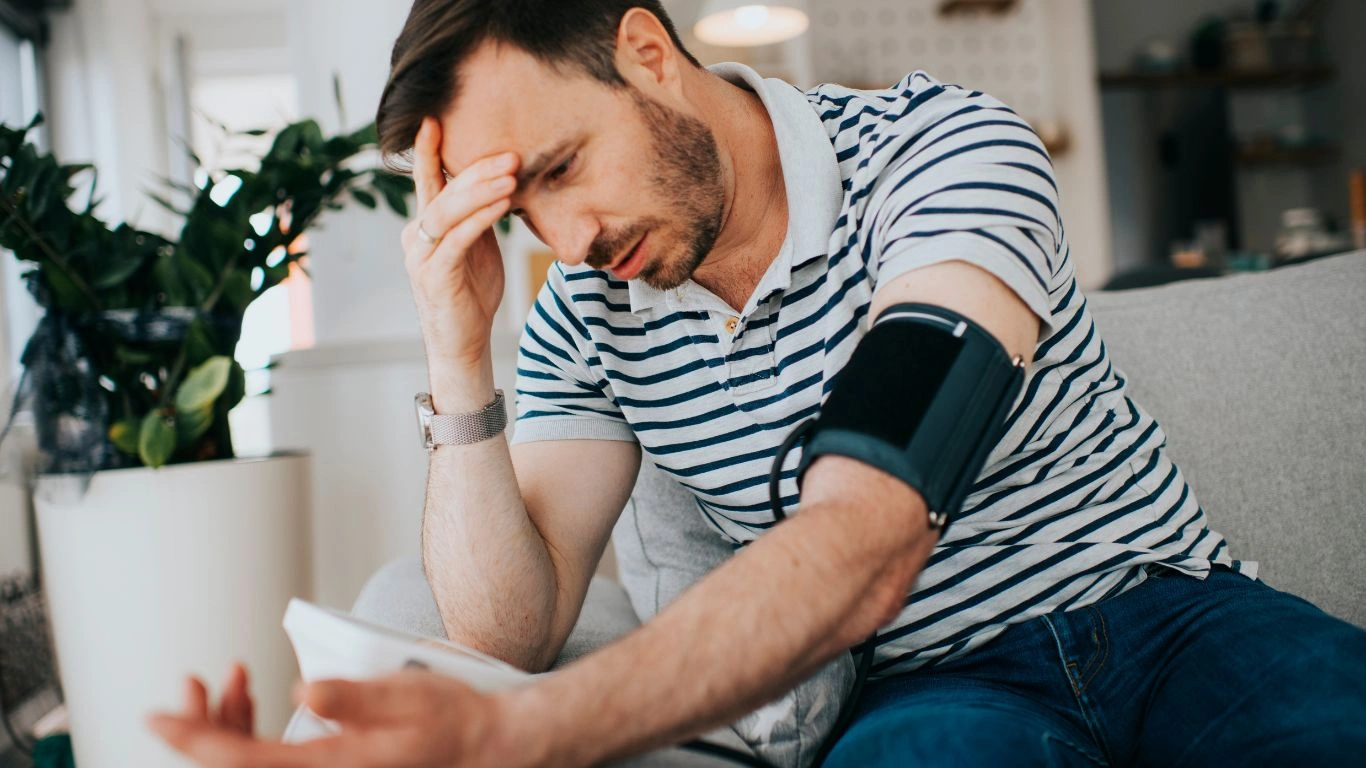Best Essential Oils for High Blood Pressure Relief: Natural Stress Relief
When it comes to managing high blood pressure, there’s no one-size-fits-all approach. As a hypertension expert, I’ve seen firsthand how lifestyle changes, diet adjustments, and, most importantly, natural remedies like essential oils can offer significant relief. In fact, many people are now turning to these plant-based solutions as a complementary treatment for hypertension. If you’re dealing with high blood pressure and are curious about how essential oils can help, you’re in the right place. In this post, we’ll explore the best essential oils for high blood pressure relief, why they work, and how you can incorporate them into your daily routine.
The Power of Essential Oils for High Blood Pressure Relief

Essential oils have been used for centuries, but they’ve gained a lot of attention recently for their ability to support heart health and reduce symptoms of hypertension. Their ability to promote relaxation, reduce stress, and even improve circulation plays a crucial role in helping to naturally lower blood pressure.
Let me tell you, there’s something incredibly calming about using a few drops of lavender or ylang-ylang oil after a long day. It’s not just about the scent; it’s the way these oils help your nervous system to unwind. Personally, I’ve seen patients experience noticeable drops in their blood pressure after consistently using essential oils as part of their overall treatment plan. And it’s not just about the oils themselves – it’s how you incorporate them into your lifestyle that makes the real difference.
How Essential Oils Work to Lower Blood Pressure
You might be wondering, “How can something so simple, like the scent of an essential oil, make a difference?” Well, the secret lies in how essential oils affect the body on a physiological level.
The Role of Relaxation in Blood Pressure Regulation
Stress and anxiety are major contributors to high blood pressure, and that’s where essential oils come in. When you inhale essential oils, they stimulate the olfactory system, which directly communicates with the brain’s limbic system—the part that controls emotions, memory, and stress response. Many essential oils are known for their ability to activate the parasympathetic nervous system, which is responsible for “rest and digest” functions, essentially calming your body and lowering heart rate.
For instance, lavender oil is one of the most researched oils for stress relief. A study published in the Journal of Hypertension found that inhaling lavender essential oil had a calming effect, significantly reducing blood pressure in participants. It’s no surprise that lavender is often recommended for people looking to relieve both physical and mental tension.
Improving Circulation and Blood Flow
Many essential oils, like geranium and peppermint, are known for their ability to improve circulation. By promoting better blood flow, these oils can help support the cardiovascular system and potentially lower blood pressure. Improved circulation means that your heart doesn’t have to work as hard to pump blood through your body, which can contribute to a more stable, healthy blood pressure.
Best Essential Oils for High Blood Pressure Relief

Now, let’s dive into some of the most effective essential oils for hypertension. While there are many oils to choose from, these are the ones I personally recommend for anyone looking to manage their high blood pressure naturally.
1. Lavender Essential Oil
As mentioned earlier, lavender is a top contender when it comes to lowering blood pressure. This oil’s calming properties are not only great for relieving stress but also for helping to improve sleep quality. Poor sleep is another risk factor for hypertension, so getting enough restful sleep can indirectly help manage blood pressure levels.
Lavender essential oil is easy to use. You can add a few drops to your pillow before bed, diffuse it in your bedroom, or even apply it topically (diluted with a carrier oil) to pulse points like your wrists and temples. It’s gentle enough for daily use, and the results are often felt quite quickly.
2. Ylang-Ylang Essential Oil
Ylang-ylang oil is another powerhouse when it comes to balancing blood pressure. This oil is often used in aromatherapy to promote emotional well-being and calm the nervous system. Ylang-ylang has been shown to reduce the stress-induced hormones like cortisol, which can, in turn, help lower blood pressure. It’s especially beneficial for those dealing with chronic stress or anxiety, both of which contribute to hypertension.
In addition to its relaxing effects, ylang-ylang has also been linked to improved mood and overall mental clarity. If you’re someone who struggles with racing thoughts or feels constantly on edge, adding ylang-ylang to your wellness routine could be a game changer.
3. Bergamot Essential Oil
Bergamot essential oil, derived from the rind of the bergamot orange, is famous for its ability to reduce stress and anxiety, both of which are closely tied to high blood pressure. It works by promoting a sense of calm and relaxation, helping to regulate emotions and even reduce heart rate in moments of tension.
What’s particularly interesting about bergamot oil is its dual-action benefit. Not only does it help with mental stress, but it also has the ability to lower cortisol levels, which is a key factor in managing hypertension. You can use bergamot in a diffuser, or try mixing a few drops with a carrier oil for a relaxing massage.
How to Use Essential Oils for Hypertension

If you’re new to essential oils, you might be wondering how to incorporate them into your daily routine. Don’t worry; it’s easier than it sounds. There are several ways to use essential oils for high blood pressure relief:
- Aromatherapy Diffusion: The simplest way to use essential oils is by diffusing them into the air. Place a few drops of your chosen oil into a diffuser and let the scent fill the room. This works well for oils like lavender, bergamot, and ylang-ylang.
- Topical Application: You can apply diluted essential oils to your skin. Always mix the essential oil with a carrier oil (like coconut or jojoba oil) to avoid irritation. Apply it to pulse points or massage it gently into your neck and shoulders.
- Inhalation: If you’re on the go, simply inhale the scent directly from the bottle or place a drop of oil on a cotton ball. This method is particularly effective for quick relief during stressful moments.
As you can see, essential oils are versatile and easy to use in your daily life. They offer a natural, holistic way to manage hypertension, and many people find them to be a helpful addition to their overall health regimen. But remember, while essential oils can help support your blood pressure management, they’re not a substitute for medical treatment. Always consult your healthcare provider before adding any new treatments to your routine.
Incorporating Essential Oils into Your Lifestyle for Better Blood Pressure Management

Now that you know about the benefits of essential oils for high blood pressure relief, the next step is figuring out how to seamlessly incorporate them into your lifestyle. And trust me, it’s easier than you might think! As someone who works in the field of hypertension prevention and management, I’ve seen countless patients who were hesitant to try essential oils, but after just a few weeks of consistent use, they’ve reported noticeable improvements in their stress levels and blood pressure readings.
There’s a real magic to using essential oils consistently, and once you find a routine that works for you, it becomes second nature. Here are a few easy ways to make essential oils a regular part of your daily practice without any hassle:
1. Create a Calming Evening Routine
In my experience, setting aside time in the evening for relaxation is one of the most effective ways to manage high blood pressure naturally. As we all know, the modern world can be chaotic, and it’s easy to carry the stress of the day into your home life. But having a moment to unwind is essential, and essential oils can play a major role in this.
Start by diffusing some lavender or chamomile oil about 30 minutes before you plan to sleep. You can create a little ritual where you set the stage for your evening relaxation. Maybe take a warm bath with a few drops of essential oil, or light a candle with your favorite calming fragrance. Doing this consistently can signal to your brain that it’s time to unwind, which can lower your stress levels and make it easier to fall into a restful sleep.
2. Try Aromatherapy During Stressful Moments
We all experience moments of stress throughout the day—whether it’s dealing with work deadlines, family responsibilities, or those sudden moments of frustration that can easily spike your blood pressure. This is where essential oils like bergamot or frankincense come in handy. I’ve suggested to many of my patients to carry a small bottle of their favorite essential oil with them for quick stress relief.
Whenever you’re feeling stressed or overwhelmed, take a deep breath and inhale the oil from the bottle. You could also dab a few drops on a cotton ball or diffuser necklace to help calm your nerves. The act of inhaling the essential oils will activate your limbic system, signaling your body to relax, and within minutes, you may notice your heart rate slow down and your blood pressure decrease.
3. Incorporate Essential Oils into Your Massage Routine
If you’ve ever had a massage with essential oils, you probably know how effective it can be in releasing tension. Well, why not make this part of your home routine? You don’t have to be a professional to reap the benefits. Simply mix a few drops of peppermint, geranium, or ylang-ylang with a carrier oil like coconut oil, and massage it into your neck, shoulders, and lower back after a long day.
Massage combined with the soothing effects of essential oils can help release physical tension, ease muscle pain, and promote relaxation. I often recommend this to my patients who have chronic stress and muscle tension. It’s also a great way to feel more in tune with your body and take a few minutes to just focus on your well-being.
Best Essential Oil Blends for Blood Pressure Support

If you’ve found a particular essential oil that works well for you, that’s fantastic! But sometimes, combining oils creates a synergistic effect that can be even more powerful. A well-crafted blend of oils can provide enhanced relaxation, improve circulation, and boost your overall mood, which ultimately helps with blood pressure management.
Here are a few essential oil blends that I recommend to patients who are looking for maximum benefits:
1. Calming Lavender & Ylang-Ylang Blend
When it comes to high blood pressure, a blend of lavender and ylang-ylang creates a dynamic duo that promotes relaxation and eases anxiety. Lavender is a natural sedative, while ylang-ylang has been shown to reduce stress hormones like cortisol.
To create your blend, mix 5 drops of lavender oil with 3 drops of ylang-ylang oil in a diffuser. The calming scent will create an environment that promotes peace and relaxation, which is key when you’re trying to manage high blood pressure. You can also apply this blend topically with a carrier oil, massaging it gently onto your pulse points or the back of your neck.
2. Bergamot & Frankincense for Stress Relief
If you find that stress is one of your biggest triggers for high blood pressure, I highly recommend the combination of bergamot and frankincense. Both oils are well-known for their ability to calm the nervous system and relieve anxiety. Frankincense, in particular, has a grounding effect on the body, while bergamot has been shown to lower cortisol levels, which directly impacts blood pressure.
This is another blend you can diffuse throughout your home, especially in the evening to help unwind after a busy day. To make the blend, add 4 drops of bergamot oil and 3 drops of frankincense oil to your diffuser. If you prefer a topical application, combine it with a carrier oil and apply it to your wrists, temples, or neck.
3. Geranium & Peppermint Blend for Circulation
If circulation and physical tension are contributing to your high blood pressure, a blend of geranium and peppermint oils can help. Geranium helps balance hormones and improve circulation, while peppermint is known for its invigorating and energizing effects. This combination can promote a sense of well-being, encourage blood flow, and reduce the physical stress that can elevate your blood pressure.
To create this blend, mix 5 drops of peppermint oil with 3 drops of geranium oil. This is a great blend to use in the morning to give you a burst of energy and enhance circulation. You can apply it to areas of your body that might hold tension, such as your shoulders or legs, or use it in a diffuser while you get ready for the day.
Safety Tips for Using Essential Oils

While essential oils are generally safe when used correctly, it’s important to follow certain safety guidelines to ensure that you’re using them safely and effectively. I always remind my patients that these oils are potent and must be handled with care.
- Always dilute oils: Essential oils are highly concentrated and should never be applied directly to the skin without dilution. Always mix them with a carrier oil (like coconut or olive oil) before applying topically.
- Patch test first: Before using a new oil, do a patch test on a small area of your skin to make sure you don’t have an allergic reaction or sensitivity.
- Avoid certain oils during pregnancy: Some essential oils, such as rosemary and eucalyptus, are not recommended during pregnancy. Always consult with your healthcare provider before using any oils if you’re pregnant or nursing.
- Consult your doctor: If you have a pre-existing medical condition or are on medication for high blood pressure, it’s always a good idea to talk to your healthcare provider before incorporating essential oils into your routine.
By following these simple guidelines, you can enjoy the benefits of essential oils safely and effectively as part of your blood pressure management routine.
Integrating Lifestyle Changes with Essential Oils for Long-Term Hypertension Management

As we’ve discussed in the previous sections, essential oils are a fantastic and natural way to manage high blood pressure. They offer numerous benefits by helping to reduce stress, improve circulation, and promote relaxation. But the real magic happens when you combine essential oils with healthy lifestyle changes. It’s not just about applying a few drops of oil and expecting results overnight—it’s about creating a holistic approach that addresses all aspects of your health. Trust me, the more you commit to small, consistent changes, the better the long-term results will be.
From personal experience and working with hundreds of patients, I can tell you that the best way to manage hypertension is through a combination of strategies. Essential oils can help lower your blood pressure, but when you add in things like a healthy diet, regular exercise, and proper stress management, you’re setting yourself up for success. So, let’s dive into some of the lifestyle changes that complement the use of essential oils and enhance their effects.
1. Eating a Heart-Healthy Diet
If you’ve been following along, you know that lifestyle plays a huge role in hypertension. But one area I often see overlooked is diet. When it comes to blood pressure, what you eat matters more than you think. A heart-healthy diet that’s rich in fruits, vegetables, lean proteins, and whole grains can help keep your blood pressure in check. I always recommend following a diet low in sodium, rich in potassium, and high in healthy fats.
The DASH diet (Dietary Approaches to Stop Hypertension) is a great place to start. This diet emphasizes foods that support heart health, such as leafy greens, berries, and foods that are rich in fiber. A diet like this works synergistically with essential oils because while oils help manage stress, a healthy diet helps maintain a balanced system overall, which ultimately keeps your blood pressure within a healthy range.
2. Regular Physical Activity
Exercise doesn’t just help keep you in shape; it also plays a crucial role in managing blood pressure. In fact, regular physical activity can significantly lower both systolic and diastolic blood pressure. For many of my patients, even something as simple as walking 30 minutes a day can result in noticeable improvements in their readings.
When combined with the calming effects of essential oils like lavender and peppermint, exercise becomes even more effective. You can use essential oils to help you unwind before or after a workout. For example, try diffusing some peppermint oil while stretching after a jog to relieve tension in your muscles and calm your nervous system. The combination of exercise and essential oils works hand in hand to support both your physical and mental well-being.
3. Stress Management with Meditation and Yoga
Stress is one of the leading causes of high blood pressure, and it’s often the most difficult factor to manage. In today’s fast-paced world, stress seems unavoidable, but there are ways to mitigate its effects. One of the best ways to reduce stress is through practices like meditation and yoga. I’ve seen firsthand how these activities can significantly lower blood pressure over time, and when paired with essential oils, they can create a truly powerful relaxation experience.
Try diffusing a calming blend of essential oils like lavender, frankincense, and cedarwood during your meditation or yoga practice. The oils will help set a calming tone, while the breathing techniques in yoga and meditation will help lower your heart rate and relax your nervous system. If you’re new to these practices, start with just 10 minutes of deep breathing or a short yoga routine before bed to help you wind down.
References and Additional Resources
It’s important to keep in mind that while essential oils can be a fantastic addition to your blood pressure management plan, they should never replace medical treatment. Always consult your healthcare provider before incorporating any new treatments, especially if you’re on medication for high blood pressure or other conditions.
Here are some valuable resources where you can find more information about hypertension and the use of essential oils:
- CDC – High Blood Pressure Overview
- American Heart Association – High Blood Pressure
- PubMed – Research Articles on Essential Oils and Hypertension
Disclaimer
The information provided in this article is for educational purposes only and is not intended to replace medical advice. Always consult with your healthcare provider before beginning any new treatment or lifestyle change, especially if you are managing a condition like hypertension. The use of essential oils should be considered as part of a broader strategy to manage blood pressure, including diet, exercise, and proper medical care. While essential oils can provide support, they should not be relied upon as a sole treatment for high blood pressure.
Remember, managing hypertension is a marathon, not a sprint. It takes a combination of good habits, smart choices, and a little bit of patience. By integrating essential oils into your routine and making heart-healthy lifestyle changes, you can give yourself the best possible chance for maintaining optimal blood pressure and long-term health.

Dr. Gwenna Aazee is a board-certified Internal Medicine Physician with a special focus on hypertension management, chronic disease prevention, and patient education. With years of experience in both clinical practice and medical writing, she’s passionate about turning evidence-based medicine into accessible, actionable advice. Through her work at Healthusias.com, Dr. Aazee empowers readers to take charge of their health with confidence and clarity. Off the clock, she enjoys deep dives into nutrition research, long walks with her rescue pup, and simplifying medical jargon one article at a time.






